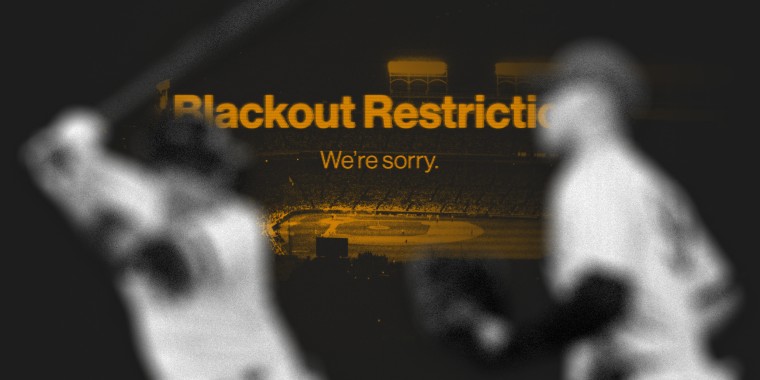When it comes to watching the Pittsburgh Pirates, Brian Meyers is batting just .031.
Meyers, who lives in York, Pennsylvania, is a cord-cutter, and the price for not having cable, enforced by Major League Baseball’s streaming rules, is that he's been able to watch only three of the 94 games his favorite team played through July 17.
"I have tried all of the internet streaming TV services but none of them provide AT&T Sportsnet for Pittsburgh," said Meyers, 30. "The only way to watch it is when the game is nationally televised on ESPN."
Meyers subscribes to the league's streaming service, MLB.tv, but all Pirates games — home and away — are blacked out in his area. He’s not alone: Pirates games are blacked out from western Ohio through most of Pennsylvania, and from the shores of Lake Ontario, including a sliver of upstate New York, through almost all of West Virginia.
The streaming television revolution was supposed to usher in an era where viewers would pay less and watch only the programs they wanted. But while it's worked out well for “Game of Thrones” watchers, cord-cutting sports fans such as Meyers say that Major League Baseball's complicated streaming rules have left them stranded at third base.
MLB.tv charges fans $119 a year to watch games, no cable subscription required. The catch: In addition to a select group of national broadcast games that are blacked out across the service, viewers aren't allowed to stream games from any team within their local broadcast market.
And those "local" markets are large: Each team’s blackout region crosses from the home state stadium into at least two other states, and, on average, spans a total of five states. The Seattle Mariners have the distinction of being the team with the largest blacked-out market, with enough land to fill the country of South Africa: more than 560,000 square miles covering parts or all of seven states, including North Dakota and Alaska.
For Meyers, this means he’s blocked from watching most of the Pirates games. But even out-of-region fans run into restrictions. Molly Cushing, a Washington Nationals fan who lives in Tempe, Ariz., and subscribes to MLB.tv, said she comes across random blackouts, like when the Nationals play the Arizona Diamondbacks.
“I think the surprise makes me even more frustrated,” said Cushing, 30.
Some parts of the country have more than one team blocked off. Fans in Connecticut are prevented from streaming games for the New York Yankees, New York Mets, and Boston Red Sox. Fans in Hawaii aren't allowed to watch any of the five California teams. Fans in Las Vegas and Iowa are blocked from watching six teams each.
The blackouts are a constant source of irritation for fans, said Phillip Swann, a television industry analyst who runs TVanswerman.com.
"There's probably not a subject that I've written about that has created more frustration that MLB blackouts," said Swann, who has covered the television industry for more than 20 years. "People can't understand if they live in a city like Vegas, why can't they watch the Dodgers. They're obviously not getting in a car and driving to the stadium."
While cord-cutters, and complaints about streaming blackouts, have grown since Dish Network introduced Sling TV as a lower-cost alternative to cable in 2015, the rules that cause the blackouts date to the 1930s and are the result of complex partnerships among the league, the 30 individual teams and the broadcasters that air their games.
While the league sells rights to select national games, each team negotiates its own local broadcast deal with a regional sports cable network, such as Fox Sports Arizona, which carries Diamondbacks games, or New England Sports Network, which airs the Red Sox. The in-market blackouts exist to protect those exclusive deals, officials told NBC News. Baseball officials consider the regional networks to be the primary way for fans to watch local games, while MLB.tv serves to fill in the gaps for fans who don’t live in range of a particular network.
Baseball isn’t the only sport dealing with local-market streaming blackouts. The National Basketball Association and National Hockey League also prohibit in-market viewing on their streaming services.
Cord-cutters do have options. Streaming services such as Sling TV, YouTube TV, PlayStation Vue and fuboTV carry several of the regional sports networks, allowing viewers to catch games without signing up for cable package. And this season MLB and YouTube have teamed up to stream select games online for free.
But those options don’t help Meyers. The Pirates are currently scheduled to play on ESPN one more time this season, giving him just one last chance to see his team on TV.
“The blackouts affect a lot of people,” Meyers said. “They could be gaining more money if they removed them to let the locals watch their favorite teams.”

